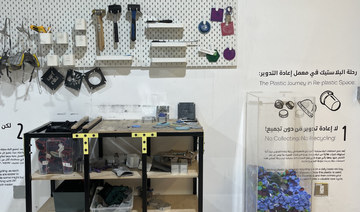DHAHRAN: King Abdulaziz Center for World Culture, or Ithra, recently opened “Etel Adnan: Between East and West,” a major retrospective exhibition showcasing 41 works of the late Lebanese-American artist, poet and philosopher.
Revered as one of the most renowned contemporary artists from the region — and still considered a major figure in the Arab modernism movement — the space at Ithra’s gallery is the first solo exhibition of Adnan’s work in Saudi Arabia, running until June 30.

Born in Lebanon in 1925 to a Greek mother and Syrian father, the poet is most famous for her 1977 novel “Sitt Marie Rose,” about the Lebanese civil war. (Supplied)
“‘Etel Adnan: Between East and West’ presents a wonderful opportunity to spotlight Etel Adnan, a key figure in global contemporary art, whose identity and work are deeply rooted in the Arab world and its rich heritage,” said Farah Abushullaih, head of museum at Ithra.
“As a versatile artist, Adnan seamlessly navigated between the realms of written and visual arts, with Arabic scripture acting as a bridge between the two, a motif that Adnan was particularly drawn to.”

Farah Abushullaih, head of museum at Ithra. (Ithra/ Ahmed Al-Thani)
Abushullaih added: “Through this exhibition, Ithra continues its commitment to introduce significant artists to Saudi audiences, shedding light on their impactful artistic contributions, further inspiring and invigorating the Kingdom’s creative landscape.”
With works of art varying sizes and mediums, the 41 works on display span from the beginning of Adnan’s artistic career in the late 1950s through to her final creations in 2021, shortly before her death that year.
Some of the works are on loan from significant international institutions such as the Sharjah Art Foundation, Sfier-Semler Gallery and Sursock Museum. Some are part of private collections.

Ithra recently opened “Etel Adnan: Between East and West,” a major exhibition showcasing 41 works of the late Lebanese-American artist. (Ithra/ Ahmed Al-Thani)
Born in Beirut under French colonial rule in 1925, Adnan grew up speaking — and later publishing works — in French. She grappled with a sense of “placement” as her Greek mother and Turkish father were both “displaced” and she found solace in creating works that “spoke Arabic” in her paintings.
Her poignant quote was adorned on the Ithra wall leading up to the gallery space read: “I didn’t need to write in French anymore, I was going to paint in Arabic.”
Adnan started painting in the early 1960s. She lived in Lebanon, France then in San Francisco in the US. An avid traveler, she was often influenced by her frequent trips to Mexico and North Africa.

Ithra recently opened “Etel Adnan: Between East and West,” a major exhibition showcasing 41 works of the late Lebanese-American artist. (Ithra/ Ahmed Al-Thani)
While settling in California, she became transfixed by Mount Tamalpais, a fixation that she dedicated much of her life to. She also merged poetry with folded paper in the leporello style, which results in artist books that are styled like an accordion.
“These pieces unfold to reveal an intimate dialogue between visual and written languages, as well as a close connection between the artist’s Western and Arab influences. Adnan harnessed this format to present visual interpretations of poems by great contemporary Arab writers, combining both across each fold, inviting the viewer to embark on a literary and visual journey,” Ithra said in a statement.
The exhibition opens with a striking 25 sq m ceramic mural, a screening of “Motion” that is a montage of several Super 8 films made by Adnan in the US in the 1980s.

Ithra recently opened “Etel Adnan: Between East and West,” a major exhibition showcasing 41 works of the late Lebanese-American artist. (Ithra/ Ahmed Al-Thani)
Among the showcased works are Adnan’s iconic hand-woven wool tapestries, which were inspired by the Persian rugs of her childhood. Also included was a wide array of oil and watercolor paintings.
The abstract and elemental works demonstrate Adnan’s masterful handling of color and nuance, as she was able to form bold strokes or delicate details to further blur the lines and to form her own visual language to communicate and express.
From the vibrant exuberance of her early works to the contemplative depths of her later pieces, this exhibition presents the burst of Adnan’s artistic expression.
“A multicultural artist par excellence — bridging Eastern and Western influences — this exhibition contributes to Ithra’s commitment to programming that promotes cross-cultural exchange and understanding,” Ithra said in a statement. “The exhibition’s catalogue, published by Hatje Cantz in both Arabic and English, will feature contributions from Sebastien Delot, alongside art historian, writer and poet Toni Maraini and art historian, publisher and curator Morad Montazami.”
On opening night, the curator of the show, Sebastien Delot, former director of Musee LaM, or Lille Metropole Musee d’art moderne, d’art contemporain et d’art brut, was on hand to offer detailed tours of the works that, after all the years spent advocating for her art to be seen more, still means so much to him.

Curator of the show, Sebastien Delot, was on hand to offer detailed tours of the works. (Ithra/ Ahmed Al-Thani)
“I am honored to have had the opportunity to work closely with Ithra to curate the first retrospective exhibition of Etel Adnan’s work in Saudi Arabia,” Delot said.
“I’m thrilled that such a wide breadth of Adnan’s works will be brought to Saudi audiences, further widening the reach of her oeuvre, particularly within a region that was so significant to Adnan personally and professionally. Her works beautifully resonate with the Saudi landscape, creating cross-cultural connections that embody a modernity that transcends boundaries,” he said.
Tickets to the exhibition are available on ithra.com.






























